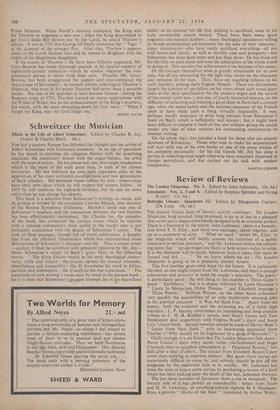Schweitzer the Musician
Music in the Life of Albert Schweitzer. Edited by Charles R. Joy. (Adam & Charles Black. 16s.) FOR half a century Europe has followed the thought and the action of Albert Schweitzer with fascinated attention. In an age of specialists he has dared to combine the religious thinker with the practising musician, the missionary doctor with the organ-builder, the artist with the man of action. He has preserved, too, that single-mindedness which is the mark of the truly great man, in each of his chosen territories. He has followed his own path regardless alike of the opposition of his more orthodox co-religionists and new generations of Bach scholars. His personal vision suffices for him : others must have their own ideas which he will respect but cannot follow. In 1955 he will celebrate his eightieth' birthday, but he can no more retire than he can change his identity.
This book is a selection from Schweitzer's writings on music, and its preface is written by the conductor Charles Munch, now director of the Boston Symphony Orchestra. Munch's uncle was one of Schweitzer's teachers and the connection between the two families has been affectionately maintained. Mr. Charles Joy, the compiler of the book, has connected the various essays which he reprints with a running commentary most useful to the reader who is not intimately acquainted with the details of Schweitzer's career. The tone of these passages, though full of warm admiration, is happily free from the offensive fulsomeness which has characterised some descriptions of Schweitzer's character and life. Thus a recent writer —quoted, it must be admitted, with apparent approval by Mr. Joy— likens Schweitzer's career to Bach's great Mass in the following words. " The Kyrie Eidson would be his early theological contro- versy, strife and victory ; the Gratias aginnis his musical triumphs, cheerfulness and tranquillity ; the Et Incarnates his work in Africa, sacrifice and redemption ; the Crucifixus his war experience." The ineptitude of such writing is made clear by much in the present book : for it is clear that Schweitzer's greatest triumph lies in 11is marvellous
ability so to conduct his life that nothing is sacrificed, none of his truly remarkable talents buried. There have been many great organists and musical thinkers ; many theological speculators willing to forego ecclesiastical advancement for the sake of their opinions ; many missionaries who have really sacrificed everything—all ties with home and family, as well as worldly ease and prosperity—but Schweitzer has done both more and less than these. He has lived out his life fully on each plane and won the admiration of the whole world in doing so. Not sacrifice but achievement is the keynote of his career.
Of the extracts themselves none is greatly remarkable for its own sake, but all are interesting for the light they throw on the character and opinions of the man. Thus, there are touching tributes to his early teachers, among them Eugene Munch. There are discussions, largely the concern of specialists, on his views about such vexed ques- tions as the ideal specification for the modern organ and the revival of the round violin bow ; • and one, of purely historical interest, on the difficulty of collecting and training a good choir in Paris half a century ago, when the social habits and the national character of the French seem to have made such a thing virtually impossible. It was, perhaps, hardly necessary to print long extracts from Schweitzer's book on Bach, which is sufficiently well known ; but it might have been difficult to compile a book of this sort without giving the casual reader any idea of what remains his outstanding contribution to musical writing.
On the whole then, this remains a book for those who are already devotees of Schweitzer. Those who wish to make his acquaintance will start with one of his own books or one of the many studies of his complete personality ; for his old friends Mr. Joy has done a service in collecting what might otherwise have remained dispersed in foreign periodicals, and has carried out his task with modest competency. MARTIN COOPER


































 Previous page
Previous page